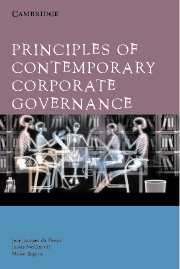Book contents
- Frontmatter
- Contents
- Table of cases
- Table of statutes
- Preface
- PART ONE CORPORATE GOVERNANCE: AN OVERVIEW
- PART TWO CORPORATE GOVERNANCE IN AUSTRALIA
- PART THREE CORPORATE GOVERNANCE IN PRACTICE
- 9 Implementation of the ASX Best Practice Recommendations: charters, policies and codes
- 10 Auditors and audits
- 11 Directors' duties and liability
- PART FOUR CORPORATE GOVERNANCE: AN INTERNATIONAL PERSPECTIVE
- PART FIVE CORPORATE GOVERNANCE: GOING FORWARD
- Index
10 - Auditors and audits
- Frontmatter
- Contents
- Table of cases
- Table of statutes
- Preface
- PART ONE CORPORATE GOVERNANCE: AN OVERVIEW
- PART TWO CORPORATE GOVERNANCE IN AUSTRALIA
- PART THREE CORPORATE GOVERNANCE IN PRACTICE
- 9 Implementation of the ASX Best Practice Recommendations: charters, policies and codes
- 10 Auditors and audits
- 11 Directors' duties and liability
- PART FOUR CORPORATE GOVERNANCE: AN INTERNATIONAL PERSPECTIVE
- PART FIVE CORPORATE GOVERNANCE: GOING FORWARD
- Index
Summary
Audited financial statements are an important part of the financial information that is available to the capital markets and an important part of effective corporate governance.
Ian M Ramsay, Independence of Australian Company Auditors: Review of Current Australian Requirements and Proposals for Reform, Report to the Minister for Financial Services and Regulation, Canberra, Department of Treasury, October 2001 [4.01].Introduction: The audit role and where it fits into corporate governance
Overview of the audit role
Auditing is:
the process by which a competent, independent person accumulates and evaluates evidence about quantifiable information related to a specific economic entity for the purpose of determining and reporting on the degree of correspondence between the quantifiable information and the established criteria.
Companies which are required to prepare a financial report for a financial year must have their financial report audited and obtain an auditor's report. Thus, all large proprietary companies and public companies must appoint an auditor. Small proprietary companies in normal circumstances are not required to prepare a financial report and hence need not appoint an auditor. However, they must do so in a limited range of circumstances, namely where shareholders holding at least 5 percent of voting shares require preparation of accounts and ask for an auditor.
Broadly the function of an auditor is to conduct an audit on the financial affairs of the company and ascertain if the financial report provided by the company complies with relevant legal requirements and accounting principles and gives a true and accurate account of the company's financial affairs.
- Type
- Chapter
- Information
- Principles of Contemporary Corporate Governance , pp. 238 - 257Publisher: Cambridge University PressPrint publication year: 2005

